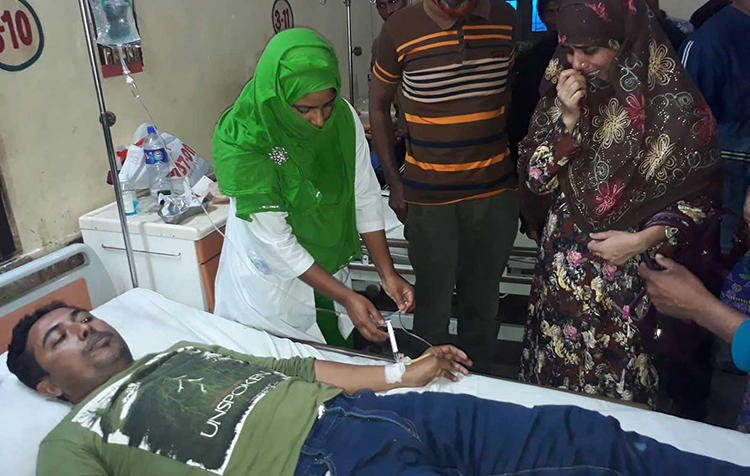In the evening of March 13, 2020, men in paramilitary uniforms accompanied by local administrative officials in Kurigram District, in northern Bangladesh, raided the home of Ariful Islam, the area’s correspondent for the English-language Dhaka Tribune daily, and arrested him after allegedly finding illegal drugs in the house, according to news reports.
During and immediately after the arrest, those men beat Islam with a wooden stick for an hour and a half, breaking his right arm and causing bruises across his body, according to the Dhaka Tribune and Islam, who spoke to CPJ in a phone interview.
At about 1:30 a.m. on March 14, a mobile court tried, convicted, and sentenced Islam to one year in prison for drug possession, according to those news reports. Mobile courts are used in Bangladesh to quickly adjudicate cases such as driving infractions, food contamination, and drug charges, according to reports.
On March 15, a different court in Kurigram ordered Islam released on bail in response to a petition filed by the president of the Kurigram Press Club, a local journalists’ association, according to reports.
On March 19, Islam filed a complaint with the local police about his arrest, incarceration, and assault, according to reports. He told CPJ that the drugs had been planted in his home, and that the raid was in retaliation for articles he had written that included allegations of corruption against local officials.
Islam told CPJ that he received medical treatment at a local hospital after his release, but more than a week after the incident, he said he was still in considerable pain.
On March 23, the national High Court, located in Dhaka, the capital, stayed Islam’s conviction for six months, according to news reports. The ruling came in response to a writ filed to the court on behalf of Harun-U-Rashid, executive editor of the Dhaka Tribune, according to those reports.
The court’s ruling questioned the Kurigram District government about whether the mobile court’s actions should be declared illegal and void, according to those reports. The High Court also asked that the police treat Islam’s complaint as a first information report, allowing formal investigations and the legal process to proceed, according to those reports.
Islam told CPJ that he believed Sultana Pervin, a deputy commissioner in the Kurigram District government, ordered the raid in retaliation for articles he had written about her, most recently about a renovated pond in Kurigram that was named after her. On March 15, administrative authorities removed Pervin from her position, according to reports.
“[Islam] had written a few stories in the past talking about corruption, hinting at corruption at the deputy commissioner level,” said Zafar Sobhan, Dhaka Tribune editor-in-chief, in a phone interview with CPJ.
During Islam’s detention, the Editors Council, a nationwide professional association of newspaper editors, called for the case against him to be dropped and for Pervin to be removed from her position, according to reports.
“The support I received was tremendous,” Islam told CPJ. “There were widespread demonstrations among journalist communities protesting the conviction and the false accusation.”
Sobhan attributed Islam’s release to the widespread news coverage of his case, and told CPJ that the paper was providing support for Islam’s medical care and legal costs.
“I think this was really a rogue public servant,” Sobhan said. “I don’t think there’s a history of this kind of overreach.”
Islam told CPJ he worries about his safety, saying that he is afraid that local officials “may try to take revenge against me.”
CPJ emailed the Kurigram District government seeking comment, and texted Sultana Pervin, but did not receive any replies.
